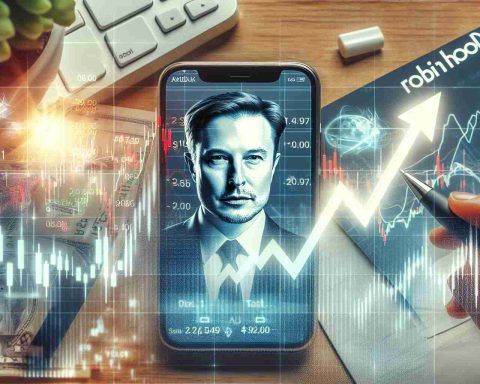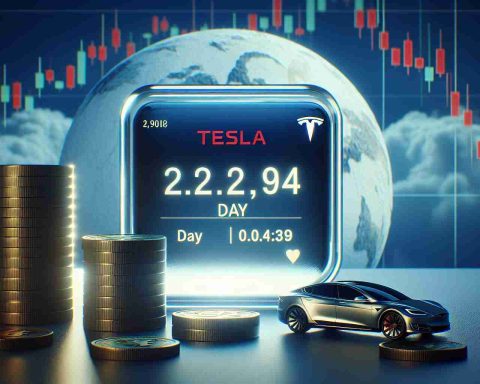A recent incident involving Elon Musk has ignited a firestorm of criticism after an activist group displayed an image of him making a gesture reminiscent of the Roman salute at Tesla’s Berlin factory. Above the billionaire’s image was the word “Heil,” prompting many to draw parallels to the salute associated with Nazi Germany.
The British political campaign organization, Led By Donkeys, is responsible for the projection, linking Musk’s actions to funding far-right movements across Europe. They emphasized that people should reconsider their purchases of Tesla vehicles, aiming to diminish Musk’s significant influence. In response to the backlash, Musk dismissed the criticisms on his social media, joking about Nazi figures and using puns to deflect the serious nature of the allegations.
This sarcastic tone has not gone unnoticed; the Anti-Defamation League, initially supportive of Musk, later expressed dismay over his jokes, stating it was highly inappropriate to trivialize the Holocaust. The CEO of the ADL condemned the remarks, reiterating that such events should never be the subject of humor or casual commentary.
As the dust settles, the broader implications of Musk’s gestures and social media antics continue to resonate, raising questions about accountability in the face of historical trauma.
The Echoes of Influence: Musk’s Actions and Their Broader Implications
Elon Musk’s recent misstep underscores the profound impact of social media influencers and corporate leaders on societal norms and values. As individuals grapple with the gravity of historical events, figures like Musk wield the power to shape public perception, making their words and actions all the more consequential. Musk’s deflection in response to serious criticism not only trivializes a fragile part of history but also sends a message about the accountability—and lack thereof—of powerful figures in today’s discourse.
This incident raises significant questions about the intersection of corporate responsibility and social awareness. In today’s global economy, where narratives travel fast across digital platforms, leaders are increasingly held to higher standards of conduct. Musk’s dismissal of concerns may embolden like-minded individuals or organizations, potentially encouraging the perpetuation of divisive ideologies. As consumers pivot toward ethical purchasing, the backlash against Musk could diminish Tesla’s market share, especially among socially conscious buyers.
Environmentally, the long-term impact of influential figures like Musk extends beyond personal behavior; the conversation around his actions could steer market dynamics toward more sustainable practices. The rising movement advocating for ethical investing may become a decisive factor, influencing company policies and fostering greater corporate transparency. As stakeholders demand accountability, the implications of Musk’s conduct could reverberate through both the corporate sphere and societal values for years to come.
Elon Musk’s Controversial Gesture Sparks Debate: A Deeper Look at Implications and Reactions
Understanding the Incident
Recently, an incident involving Elon Musk has garnered significant media attention, igniting conversations around social responsibility and accountability in the public eye. During a demonstration at Tesla’s factory in Berlin, an activist group projected an image of Musk alongside the word “Heil,” interpreted by many as a reference to the Nazi salute. This visual presentation aimed to connect Musk to his financial support for various far-right movements throughout Europe, heightening scrutiny over his influence on public sentiment and purchasing decisions.
The Role of Activist Organizations
The activist group, Led By Donkeys, actively campaigns against the normalization of far-right ideologies. Their actions underscore a growing trend where citizens and organizations hold influential figures accountable for their rhetoric and affiliations. In the wake of this incident, they have encouraged consumers to reconsider their Tesla purchases, framing it as a challenge to Musk’s sway in the automotive market.
Public and Institutional Reactions
In the aftermath, Musk’s dismissive response on social media—characterized by sarcastic jokes and puns—has been met with backlash. Notably, the Anti-Defamation League (ADL), which initially leaned toward a more supportive stance regarding Musk, later expressed disappointment at his trivialization of serious historical events. The organization’s leadership underscored the gravity of the Holocaust, emphasizing the importance of treating such topics with the respect they deserve.
Implications for Accountability and Corporate Responsibility
This incident highlights a growing concern regarding accountability, particularly for public figures with substantial influence. Musk’s platforms and behaviors can sway public opinion, leading to discussions about the responsibilities that come with such power. As society becomes increasingly aware of the historical implications of certain actions and gestures, the call for accountability extends beyond individuals to corporations and institutions as well.
Trends and Insights on Consumer Behavior
The backlash against Musk has potential implications for consumer behavior within the EV market. As social activism continues to influence purchasing decisions, buyers may seek brands that embody ethical practices and social responsibility. This trend can reshape market dynamics as consumers lean toward companies that align with their values over those linked to controversial figures.
Looking Ahead: Predictions for Tesla and Musk
As the controversy unfolds, industry observers anticipate varying impacts on Tesla’s market performance. Will this incident affect sales or brand loyalty? Early indicators suggest that consumer sentiment is shifting. Continued activism and scrutiny could lead to significant changes in how public figures, particularly in technology and automotive sectors, navigate their roles and responsibilities in an increasingly socially conscious market.
Conclusion
The recent events surrounding Elon Musk serve as a stark reminder of the interconnectedness of public persona, consumer behavior, and social accountability. As society reflects on the implications of such incidents, it is crucial for influential figures to consider the broader impact of their actions and statements. The dialogue initiated by this controversy may not only reshape perceptions of Musk and Tesla but also set precedents for how corporations engage with social issues moving forward.



















